
- Bioactive Compounds
- By Signaling Pathways
- PI3K/Akt/mTOR
- Epigenetics
- Methylation
- Immunology & Inflammation
- Protein Tyrosine Kinase
- Angiogenesis
- Apoptosis
- Autophagy
- ER stress & UPR
- JAK/STAT
- MAPK
- Cytoskeletal Signaling
- Cell Cycle
- TGF-beta/Smad
- Compound Libraries
- Popular Compound Libraries
- Customize Library
- Clinical and FDA-approved Related
- Bioactive Compound Libraries
- Inhibitor Related
- Natural Product Related
- Metabolism Related
- Cell Death Related
- By Signaling Pathway
- By Disease
- Anti-infection and Antiviral Related
- Neuronal and Immunology Related
- Fragment and Covalent Related
- FDA-approved Drug Library
- FDA-approved & Passed Phase I Drug Library
- Preclinical/Clinical Compound Library
- Bioactive Compound Library-I
- Bioactive Compound Library-II
- Kinase Inhibitor Library
- Express-Pick Library
- Natural Product Library
- Human Endogenous Metabolite Compound Library
- Alkaloid Compound LibraryNew
- Angiogenesis Related compound Library
- Anti-Aging Compound Library
- Anti-alzheimer Disease Compound Library
- Antibiotics compound Library
- Anti-cancer Compound Library
- Anti-cancer Compound Library-Ⅱ
- Anti-cancer Metabolism Compound Library
- Anti-Cardiovascular Disease Compound Library
- Anti-diabetic Compound Library
- Anti-infection Compound Library
- Antioxidant Compound Library
- Anti-parasitic Compound Library
- Antiviral Compound Library
- Apoptosis Compound Library
- Autophagy Compound Library
- Calcium Channel Blocker LibraryNew
- Cambridge Cancer Compound Library
- Carbohydrate Metabolism Compound LibraryNew
- Cell Cycle compound library
- CNS-Penetrant Compound Library
- Covalent Inhibitor Library
- Cytokine Inhibitor LibraryNew
- Cytoskeletal Signaling Pathway Compound Library
- DNA Damage/DNA Repair compound Library
- Drug-like Compound Library
- Endoplasmic Reticulum Stress Compound Library
- Epigenetics Compound Library
- Exosome Secretion Related Compound LibraryNew
- FDA-approved Anticancer Drug LibraryNew
- Ferroptosis Compound Library
- Flavonoid Compound Library
- Fragment Library
- Glutamine Metabolism Compound Library
- Glycolysis Compound Library
- GPCR Compound Library
- Gut Microbial Metabolite Library
- HIF-1 Signaling Pathway Compound Library
- Highly Selective Inhibitor Library
- Histone modification compound library
- HTS Library for Drug Discovery
- Human Hormone Related Compound LibraryNew
- Human Transcription Factor Compound LibraryNew
- Immunology/Inflammation Compound Library
- Inhibitor Library
- Ion Channel Ligand Library
- JAK/STAT compound library
- Lipid Metabolism Compound LibraryNew
- Macrocyclic Compound Library
- MAPK Inhibitor Library
- Medicine Food Homology Compound Library
- Metabolism Compound Library
- Methylation Compound Library
- Mouse Metabolite Compound LibraryNew
- Natural Organic Compound Library
- Neuronal Signaling Compound Library
- NF-κB Signaling Compound Library
- Nucleoside Analogue Library
- Obesity Compound Library
- Oxidative Stress Compound LibraryNew
- Plant Extract Library
- Phenotypic Screening Library
- PI3K/Akt Inhibitor Library
- Protease Inhibitor Library
- Protein-protein Interaction Inhibitor Library
- Pyroptosis Compound Library
- Small Molecule Immuno-Oncology Compound Library
- Mitochondria-Targeted Compound LibraryNew
- Stem Cell Differentiation Compound LibraryNew
- Stem Cell Signaling Compound Library
- Natural Phenol Compound LibraryNew
- Natural Terpenoid Compound LibraryNew
- TGF-beta/Smad compound library
- Traditional Chinese Medicine Library
- Tyrosine Kinase Inhibitor Library
- Ubiquitination Compound Library
-
Cherry Picking
You can personalize your library with chemicals from within Selleck's inventory. Build the right library for your research endeavors by choosing from compounds in all of our available libraries.
Please contact us at [email protected] to customize your library.
You could select:
- Antibodies
- Bioreagents
- qPCR
- 2x SYBR Green qPCR Master Mix
- 2x SYBR Green qPCR Master Mix(Low ROX)
- 2x SYBR Green qPCR Master Mix(High ROX)
- Protein Assay
- Protein A/G Magnetic Beads for IP
- Anti-DYKDDDDK Tag magnetic beads
- Anti-DYKDDDDK Tag Affinity Gel
- Anti-Myc magnetic beads
- Anti-HA magnetic beads
- Poly DYKDDDDK Tag Peptide lyophilized powder
- Protease Inhibitor Cocktail
- Protease Inhibitor Cocktail (EDTA-Free, 100X in DMSO)
- Phosphatase Inhibitor Cocktail (2 Tubes, 100X)
- Cell Biology
- Cell Counting Kit-8 (CCK-8)
- Animal Experiment
- Mouse Direct PCR Kit (For Genotyping)
- New Products
- Contact Us
IGF-1R
Isoform-selective Products
Signaling Pathway

IGF-1R Products
- All (33)
- IGF-1R Inhibitors (22)
- IGF-1R Antibodies (6)
- IGF-1R Antagonist (1)
- IGF-1R Modulators (3)
- New IGF-1R Products
| Catalog No. | Product Name | Information | Product Use Citations | Product Validations |
|---|---|---|---|---|
| S1091 | Linsitinib (OSI-906) | Linsitinib (OSI-906) is a selective inhibitor of IGF-1R with IC50 of 35 nM in cell-free assays; modestly potent to InsR with IC50 of 75 nM, and no activity towards Abl, ALK, BTK, EGFR, FGFR1/2, PKA etc. Phase 3. |
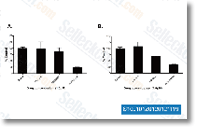
|
|
| S7083 | Ceritinib | Ceritinib is a potent inhibitor against ALK with IC50 of 0.2 nM in cell-free assays. Ceritinib (LDK378) also inhibits IGF-1R, InsR, STK22D and FLT3 with IC50 of 8 nM, 7 nM, 23 nM and 60 nM, respectively. Phase 3. |
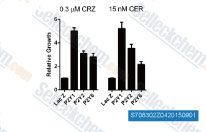
|
|
| S1069 | Luminespib (NVP-AUY922) | Luminespib (AUY-922, NVP-AUY922, VER-52296) is a highly potent HSP90 inhibitor for HSP90α/β with IC50 of 13 nM /21 nM in cell-free assays, weaker potency against the HSP90 family members GRP94 and TRAP-1, exhibits the tightest binding of any small-molecule HSP90 ligand. Luminespib (AUY-922, NVP-AUY922) effectively downregulates and destabilizes the IGF-1Rβ protein and results in growth inhibition, autophagy and apoptosis. Phase 2. |
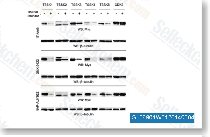
|
|
| S1034 | NVP-AEW541 | NVP-AEW541 is a potent inhibitor of IGF-1R/InsR with IC50 of 150 nM/140 nM in cell-free assays, greater potency and selectivity for IGF-1R in a cell-based assay. |
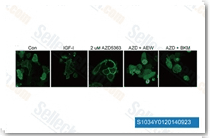
|
|
| S1124 | BMS-754807 | BMS-754807 is a potent and reversible inhibitor of IGF-1R/InsR with IC50 of 1.8 nM/1.7 nM in cell-free assays, less potent to Met (c-Met), Aurora A/B, TrkA/B and Ron, and shows little activity to Flt3, Lck, MK2, PKA, PKC etc. Phase 2. |
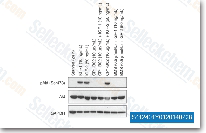
|
|
| S7668 | Picropodophyllin (PPP) | Picropodophyllin (PPP, AXL1717) is a IGF-1R inhibitor with IC50 of 1 nM. It displays selectivity for IGF-1R and does not coinhibit tyrosine phosphorylation the IR, or of a selected panel of receptors less related to IGF-IR(FGF-R, PDGF-R, OR EGF-R). Picropodophyllin (PPP) induces apoptosis with antineoplastic activity. |
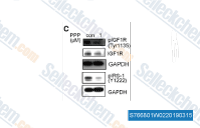
|
|
| S8229 | Brigatinib | Brigatinib is a potent and selective ALK (IC50, 0.6 nM) and ROS1 (IC50, 0.9 nM) inhibitor. It also inhibits IGF-1R, FLT3, and mutant variants of FLT3 (D835Y) and EGFR with lower potentcy. |
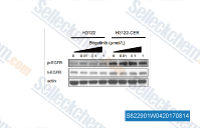
|
|
| S1093 | GSK1904529A | GSK1904529A (GSK 4529) is a selective inhibitor of IGF-1R and IR with IC50 of 27 nM and 25 nM in cell-free assays, >100-fold more selective for IGF-1R/InsR than Akt1/2, Aurora A/B,B-Raf, CDK2, EGFR etc. |
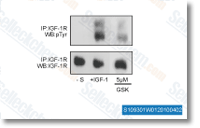
|
|
| S1012 | BMS-536924 | BMS-536924 (CS-0117) is an ATP-competitive IGF-1R/IR inhibitor with IC50 of 100 nM/73 nM, modest activity for Mek, Fak, and Lck with very little activity for Akt1, MAPK1/2. |
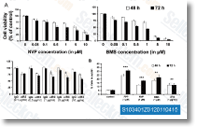
|
|
| S1234 | AG-1024 | AG-1024 (Tyrphostin, AGS 200) inhibits IGF-1R autophosphorylation with IC50 of 7 μM, is less potent to IR with IC50 of 57 μM and specifically distinguishes between InsR and IGF-1R (as compared to other tyrphostins). |
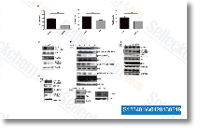
|
|
| S1088 | NVP-ADW742 | NVP-ADW742 (GSK 552602A) is an IGF-1R inhibitor with IC50 of 0.17 μM, >16-fold more potent against IGF-1R than InsR; little activity to HER2, PDGFR, VEGFR-2, Bcr-Abl and c-Kit. |
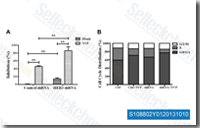
|
|
| S2703 | GSK1838705A | GSK1838705A is a potent IGF-1R inhibitor with IC50 of 2.0 nM, modestly potent to IR and ALK with IC50 of 1.6 nM and 0.5 nM, respectively, and little activity to other protein kinases. |
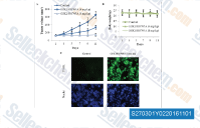
|
|
| S4967 | Ceritinib dihydrochloride | Ceritinib (Zykadia, LDK378) dihydrochloride is a selective, orally bioavailable and ATP-competitive inhibitor of ALK with IC50 of 0.2 nM. Ceritinib dihydrochloride also inhibits InsR, IGF-1R and STK22D with IC50 of 7 nM, 8 nM and 23 nM, respectively. Ceritinib exhibits antitomor activity. | ||
| S8228 | NT157 | NT157, a selective inhibitor of IRS-1/2(insulin receptor substrate), has the potential to inhibit IGF-1R and STAT3 signaling pathways in cancer cells and stroma cells of TME leading to a decrease in cancer cell survival. | ||
| S7106 | AZD3463 | AZD3463 is a novel orally bioavailable ALK inhibitor with Ki of 0.75 nM, which also inhibits IGF1R with equivalent potency. AZD3463 suppresses cell viability by inducing both cell apoptosis and autophagy. |
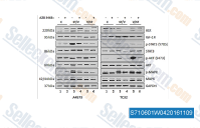
|
|
| S8003 | PQ 401 | PQ401 inhibits autophosphorylation of IGF-1R domain with IC50 of <1 μM. |
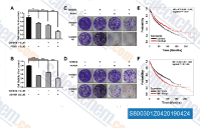
|
|
| S3984 | Nordihydroguaiaretic acid (NDGA) | Nordihydroguaiaretic acid (NDGA) is a phenolic antioxidant found in the leaves and twigs of the evergreen desert shrub, Larrea tridentata (Sesse and Moc. ex DC) Coville (creosote bush). It is a recognized inhibitor of lipoxygenase (LOX) and has antioxidant and free radical scavenging properties. Nordihydroguaiaretic acid (NDGA) is a cytotoxic insulin-like growth factor-I receptor (IGF-1R)/HER2 inhibitor and induces apoptosis. | ||
| E2459 | Ginsenoside Rg5 | Ginsenoside Rg5, the main component of Red ginseng, blocks binding of IGF-1 to its receptor with an IC50 of ~90 nM. Ginsenoside Rg5 also inhibits the mRNA expression of COX-2 via suppression of the DNA binding activities of NF-κB p65. | ||
| S6955 | Insulin (human) | Insulin (human) (Insulin regular) is a polypeptide hormone that regulates the level of glucose. Insulin is commonly used to treat hyperglycemia in patients with diabetes. Potency: 29 units/mg. | ||
| E3106 | Dioscoreae Nipponicae Rhizoma Extract | Dioscoreae Nipponicae Rhizoma Extract is extracted from the rhizome of Dioscorea nipponica, of which the main component decreases the phosphorylation in IGF-1R, which in turn inhibits the phosphorylation and activation of PI3K-AKT and Rap1-MEK signaling pathways, promoting cell apoptosis and Graves’ disease remission. | ||
| E0794 | MID-1 | MID-1 is a disruptor of MG53-IRS-1 (Mitsugumin 53-insulin receptor substrate-1) interaction, which can disrupts molecular association of MG53 with IRS-1 and abolishes MG53-induced IRS-1 ubiquitination and degradation in skeletal muscle, leading to elevated IRS-1 expression level and increased insulin signaling and glucose uptake. | ||
| A2455 | Teprotumumab (Anti-IGF-1R / CD221) | Teprotumumab (Anti-IGF-1R / CD221) is an IGF-1 receptor (IGF-1R) blocking human monoclonal antibody. Teprotumumab binds to the ligand binding extracellular α-subunit domain of IGF-1R. Teprotumumab inhibits TSH and IGF-1 action in fibrocytes. Teprotumumab can be used for thyroid-associated ophthalmopathy research.MW: 145.5 KD. | ||
| A2456 | Ganitumab (Anti-IGF-1R / CD221) | Ganitumab (Anti-IGF-1R / CD221) is a recombinant human monoclonal antibody to the human type 1 insulin-like growth factor receptor (IGF1R). Ganitumab recognizes murine IGF1R with sub-nanomolar affinity (KD=0.22 nM) and inhibits the interaction of murine IGF1R with IGF1 and IGF2. MW: 145.5 KD. | ||
| A2457 | Xentuzumab (Anti-IGF-1) | Xentuzumab (Anti-IGF-1) is a recombinant a humanized monoclonal antibody that targets IGF ligands IGF-1 and IGF-2. Xentuzumab inhibits both of IGF-1 and IGF-2 growth-promoting signalling and suppresses AKT activation. MW: 145.5 KD. | ||
| A2926 | Lonigutamab (Anti-IGF1R / CD221) | Lonigutamab (hz208F2-4) is a humanized monoclonal antibody against the insulin-like growth factor-1 receptor (IGF-1R) with the potential to treat thyroid eye disease (TED). MW: 146.26 KD. | ||
| A2942 | Figitumumab (Anti-IGF1R / CD221) | Figitumumab (Anti-IGF1R / CD221) is a human monoclonal antibody directed against the insulin-like growth factor type I receptor (IGF1R) with potential antineoplastic activity. Figitumumab prevents IGF1 from binding to IGF1R with an IC50 of 1.8 nM. MW: 146.0 KD. | ||
| A2945 | Anti-IGF2 (DX-2647) | Anti-IGF2 (DX-2647) is a human monoclonal antibody against insulin-like growth factor-II (IGF-II) with anti-tumor and anti-proliferative activities. MW: 145.78 KD. | ||
| S7453 | MSDC-0160 | MSDC-0160 (CAY10415) is a prototype mTOT-modulating insulin sensitizer being studied to treat diabetes and Alzheimer's disease. Phase 2. | ||
| E0939 | Insulin Degludec | Insulin degludec is an acylated basal insulin with a unique mechanism of protracted absorption involving the formation of a depot of soluble multihexamer chains after subcutaneous injection, shows a very long duration of action, with a half-life exceeding 25 h in PK/PD studies. | ||
| S6443 | Chromium picolinate | Chromium picolinate is a coordination complex consisting of chromium(III) and picolinic acid. It is used as a nutritional supplement for optimal insulin function in patients with Type 2 diabetes or promotion of weight loss. | ||
| S3187 | SBI-477 | SBI-477 is an insulin signaling inhibitor that deactivates the transcription factor MondoA, leading to reduced expression of the insulin pathway suppressors thioredoxin-interacting protein (TXNIP) and arrestin domain-containing 4 (ARRDC4). SBI-477 inhibits triacylglyceride (TAG) synthesis and enhances basal glucose uptake in human skeletal myocytes. | ||
| S6922 | S961 | S961 is a biosynthetic insulin receptor antagonist that inhibits cellular proliferation and colony formation in breast tumour cells. | ||
| S1272 | XL228 | XL228 is a protein kinase inhibitor with IC50 of 5 nM, 1.4 nM, 3.1 nM, 1.6 nM, 6.1 nM and 2 nM for wild-type ABL kinase, ABL T315I, Aurora A, IGF-1R, SRC and LYN, respectively. | ||
| S1091 | Linsitinib (OSI-906) | Linsitinib (OSI-906) is a selective inhibitor of IGF-1R with IC50 of 35 nM in cell-free assays; modestly potent to InsR with IC50 of 75 nM, and no activity towards Abl, ALK, BTK, EGFR, FGFR1/2, PKA etc. Phase 3. |

|
|
| S7083 | Ceritinib | Ceritinib is a potent inhibitor against ALK with IC50 of 0.2 nM in cell-free assays. Ceritinib (LDK378) also inhibits IGF-1R, InsR, STK22D and FLT3 with IC50 of 8 nM, 7 nM, 23 nM and 60 nM, respectively. Phase 3. |

|
|
| S1069 | Luminespib (NVP-AUY922) | Luminespib (AUY-922, NVP-AUY922, VER-52296) is a highly potent HSP90 inhibitor for HSP90α/β with IC50 of 13 nM /21 nM in cell-free assays, weaker potency against the HSP90 family members GRP94 and TRAP-1, exhibits the tightest binding of any small-molecule HSP90 ligand. Luminespib (AUY-922, NVP-AUY922) effectively downregulates and destabilizes the IGF-1Rβ protein and results in growth inhibition, autophagy and apoptosis. Phase 2. |

|
|
| S1034 | NVP-AEW541 | NVP-AEW541 is a potent inhibitor of IGF-1R/InsR with IC50 of 150 nM/140 nM in cell-free assays, greater potency and selectivity for IGF-1R in a cell-based assay. |

|
|
| S1124 | BMS-754807 | BMS-754807 is a potent and reversible inhibitor of IGF-1R/InsR with IC50 of 1.8 nM/1.7 nM in cell-free assays, less potent to Met (c-Met), Aurora A/B, TrkA/B and Ron, and shows little activity to Flt3, Lck, MK2, PKA, PKC etc. Phase 2. |

|
|
| S7668 | Picropodophyllin (PPP) | Picropodophyllin (PPP, AXL1717) is a IGF-1R inhibitor with IC50 of 1 nM. It displays selectivity for IGF-1R and does not coinhibit tyrosine phosphorylation the IR, or of a selected panel of receptors less related to IGF-IR(FGF-R, PDGF-R, OR EGF-R). Picropodophyllin (PPP) induces apoptosis with antineoplastic activity. |

|
|
| S8229 | Brigatinib | Brigatinib is a potent and selective ALK (IC50, 0.6 nM) and ROS1 (IC50, 0.9 nM) inhibitor. It also inhibits IGF-1R, FLT3, and mutant variants of FLT3 (D835Y) and EGFR with lower potentcy. |

|
|
| S1093 | GSK1904529A | GSK1904529A (GSK 4529) is a selective inhibitor of IGF-1R and IR with IC50 of 27 nM and 25 nM in cell-free assays, >100-fold more selective for IGF-1R/InsR than Akt1/2, Aurora A/B,B-Raf, CDK2, EGFR etc. |

|
|
| S1012 | BMS-536924 | BMS-536924 (CS-0117) is an ATP-competitive IGF-1R/IR inhibitor with IC50 of 100 nM/73 nM, modest activity for Mek, Fak, and Lck with very little activity for Akt1, MAPK1/2. |

|
|
| S1234 | AG-1024 | AG-1024 (Tyrphostin, AGS 200) inhibits IGF-1R autophosphorylation with IC50 of 7 μM, is less potent to IR with IC50 of 57 μM and specifically distinguishes between InsR and IGF-1R (as compared to other tyrphostins). |

|
|
| S1088 | NVP-ADW742 | NVP-ADW742 (GSK 552602A) is an IGF-1R inhibitor with IC50 of 0.17 μM, >16-fold more potent against IGF-1R than InsR; little activity to HER2, PDGFR, VEGFR-2, Bcr-Abl and c-Kit. |

|
|
| S2703 | GSK1838705A | GSK1838705A is a potent IGF-1R inhibitor with IC50 of 2.0 nM, modestly potent to IR and ALK with IC50 of 1.6 nM and 0.5 nM, respectively, and little activity to other protein kinases. |

|
|
| S4967 | Ceritinib dihydrochloride | Ceritinib (Zykadia, LDK378) dihydrochloride is a selective, orally bioavailable and ATP-competitive inhibitor of ALK with IC50 of 0.2 nM. Ceritinib dihydrochloride also inhibits InsR, IGF-1R and STK22D with IC50 of 7 nM, 8 nM and 23 nM, respectively. Ceritinib exhibits antitomor activity. | ||
| S8228 | NT157 | NT157, a selective inhibitor of IRS-1/2(insulin receptor substrate), has the potential to inhibit IGF-1R and STAT3 signaling pathways in cancer cells and stroma cells of TME leading to a decrease in cancer cell survival. | ||
| S7106 | AZD3463 | AZD3463 is a novel orally bioavailable ALK inhibitor with Ki of 0.75 nM, which also inhibits IGF1R with equivalent potency. AZD3463 suppresses cell viability by inducing both cell apoptosis and autophagy. |

|
|
| S8003 | PQ 401 | PQ401 inhibits autophosphorylation of IGF-1R domain with IC50 of <1 μM. |

|
|
| S3984 | Nordihydroguaiaretic acid (NDGA) | Nordihydroguaiaretic acid (NDGA) is a phenolic antioxidant found in the leaves and twigs of the evergreen desert shrub, Larrea tridentata (Sesse and Moc. ex DC) Coville (creosote bush). It is a recognized inhibitor of lipoxygenase (LOX) and has antioxidant and free radical scavenging properties. Nordihydroguaiaretic acid (NDGA) is a cytotoxic insulin-like growth factor-I receptor (IGF-1R)/HER2 inhibitor and induces apoptosis. | ||
| E2459 | Ginsenoside Rg5 | Ginsenoside Rg5, the main component of Red ginseng, blocks binding of IGF-1 to its receptor with an IC50 of ~90 nM. Ginsenoside Rg5 also inhibits the mRNA expression of COX-2 via suppression of the DNA binding activities of NF-κB p65. | ||
| E3106 | Dioscoreae Nipponicae Rhizoma Extract | Dioscoreae Nipponicae Rhizoma Extract is extracted from the rhizome of Dioscorea nipponica, of which the main component decreases the phosphorylation in IGF-1R, which in turn inhibits the phosphorylation and activation of PI3K-AKT and Rap1-MEK signaling pathways, promoting cell apoptosis and Graves’ disease remission. | ||
| E0794 | MID-1 | MID-1 is a disruptor of MG53-IRS-1 (Mitsugumin 53-insulin receptor substrate-1) interaction, which can disrupts molecular association of MG53 with IRS-1 and abolishes MG53-induced IRS-1 ubiquitination and degradation in skeletal muscle, leading to elevated IRS-1 expression level and increased insulin signaling and glucose uptake. | ||
| S3187 | SBI-477 | SBI-477 is an insulin signaling inhibitor that deactivates the transcription factor MondoA, leading to reduced expression of the insulin pathway suppressors thioredoxin-interacting protein (TXNIP) and arrestin domain-containing 4 (ARRDC4). SBI-477 inhibits triacylglyceride (TAG) synthesis and enhances basal glucose uptake in human skeletal myocytes. | ||
| S1272 | XL228 | XL228 is a protein kinase inhibitor with IC50 of 5 nM, 1.4 nM, 3.1 nM, 1.6 nM, 6.1 nM and 2 nM for wild-type ABL kinase, ABL T315I, Aurora A, IGF-1R, SRC and LYN, respectively. | ||
| A2455 | Teprotumumab (Anti-IGF-1R / CD221) | Teprotumumab (Anti-IGF-1R / CD221) is an IGF-1 receptor (IGF-1R) blocking human monoclonal antibody. Teprotumumab binds to the ligand binding extracellular α-subunit domain of IGF-1R. Teprotumumab inhibits TSH and IGF-1 action in fibrocytes. Teprotumumab can be used for thyroid-associated ophthalmopathy research.MW: 145.5 KD. | ||
| A2456 | Ganitumab (Anti-IGF-1R / CD221) | Ganitumab (Anti-IGF-1R / CD221) is a recombinant human monoclonal antibody to the human type 1 insulin-like growth factor receptor (IGF1R). Ganitumab recognizes murine IGF1R with sub-nanomolar affinity (KD=0.22 nM) and inhibits the interaction of murine IGF1R with IGF1 and IGF2. MW: 145.5 KD. | ||
| A2457 | Xentuzumab (Anti-IGF-1) | Xentuzumab (Anti-IGF-1) is a recombinant a humanized monoclonal antibody that targets IGF ligands IGF-1 and IGF-2. Xentuzumab inhibits both of IGF-1 and IGF-2 growth-promoting signalling and suppresses AKT activation. MW: 145.5 KD. | ||
| A2926 | Lonigutamab (Anti-IGF1R / CD221) | Lonigutamab (hz208F2-4) is a humanized monoclonal antibody against the insulin-like growth factor-1 receptor (IGF-1R) with the potential to treat thyroid eye disease (TED). MW: 146.26 KD. | ||
| A2942 | Figitumumab (Anti-IGF1R / CD221) | Figitumumab (Anti-IGF1R / CD221) is a human monoclonal antibody directed against the insulin-like growth factor type I receptor (IGF1R) with potential antineoplastic activity. Figitumumab prevents IGF1 from binding to IGF1R with an IC50 of 1.8 nM. MW: 146.0 KD. | ||
| A2945 | Anti-IGF2 (DX-2647) | Anti-IGF2 (DX-2647) is a human monoclonal antibody against insulin-like growth factor-II (IGF-II) with anti-tumor and anti-proliferative activities. MW: 145.78 KD. | ||
| S6922 | S961 | S961 is a biosynthetic insulin receptor antagonist that inhibits cellular proliferation and colony formation in breast tumour cells. | ||
| S6955 | Insulin (human) | Insulin (human) (Insulin regular) is a polypeptide hormone that regulates the level of glucose. Insulin is commonly used to treat hyperglycemia in patients with diabetes. Potency: 29 units/mg. | ||
| S7453 | MSDC-0160 | MSDC-0160 (CAY10415) is a prototype mTOT-modulating insulin sensitizer being studied to treat diabetes and Alzheimer's disease. Phase 2. | ||
| E0939 | Insulin Degludec | Insulin degludec is an acylated basal insulin with a unique mechanism of protracted absorption involving the formation of a depot of soluble multihexamer chains after subcutaneous injection, shows a very long duration of action, with a half-life exceeding 25 h in PK/PD studies. |
Choose Selective IGF-1R Inhibitors
Tags: IGF-1R pathway | IGF-1R cancer | IGF-1R signaling | IGF-1R pathway | IGF-1R phosphorylation | IGF-1 receptor signaling | IGF-1R signaling pathway | IGF-1 receptor signaling pathway | IGF-1R inhibitor review







































